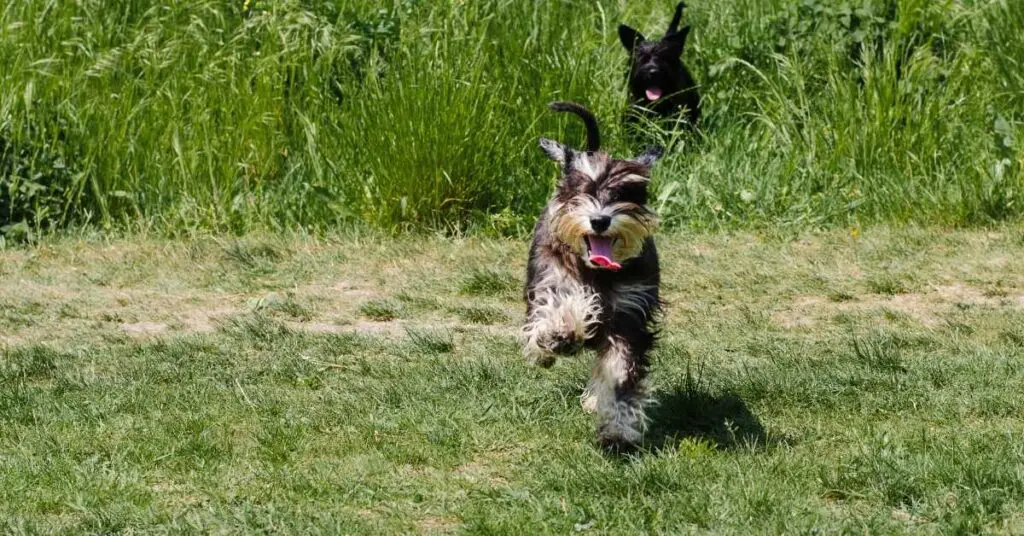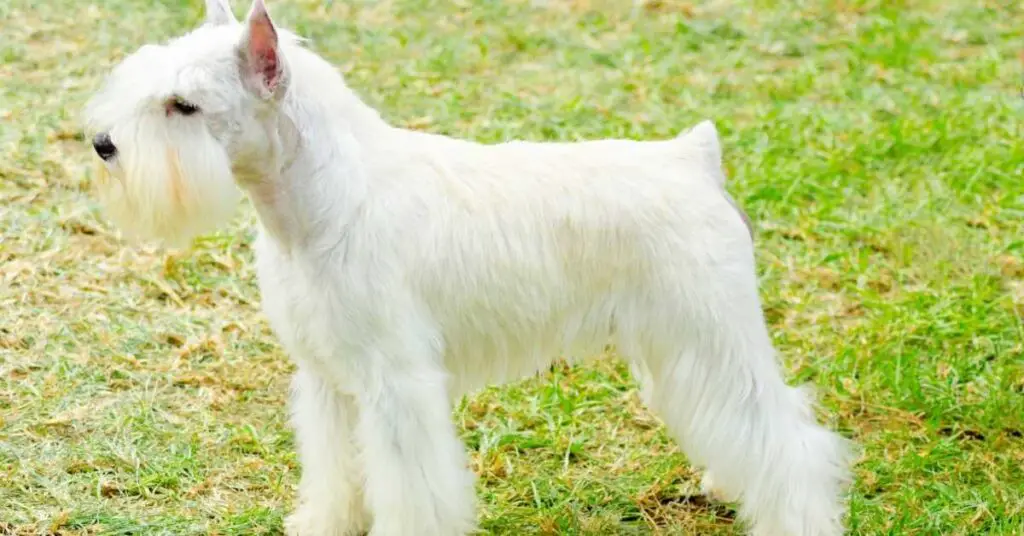So, you’ve welcomed a lively Schnauzer into your home, but do you know what’s on the menu for your furry friend? Understanding the dietary needs of your Schnauzer is crucial for their health and well-being.
From the right balance of proteins to the significance of essential vitamins and minerals, there’s a lot to consider.
But, what about the dos and don’ts of snacks and treats? Stay tuned to discover the key ingredients for a healthy and happy Schnauzer.
Key Takeaways
- Provide a balanced diet rich in protein, fiber, and essential nutrients tailored to age, weight, and activity level.
- Establish a feeding schedule and portion control to prevent obesity and regulate digestion.
- Include a variety of protein sources, essential vitamins, minerals, and healthy fats for overall well-being.
- Consult a veterinarian for personalized nutrient ratios, meal frequency, and dietary supplement recommendations.
Schnauzer’s Unique Nutritional Requirements
When catering to a Schnauzer’s unique nutritional requirements, it’s essential to provide a balanced diet rich in protein, fiber, and essential nutrients. Establishing a feeding schedule is crucial to maintain their health. Schnauzers benefit from having set meal times to regulate their digestion and prevent overeating.
Portion control is also key, as these dogs can be prone to obesity if given excessive amounts of food. It’s important to tailor the portion sizes to your Schnauzer’s individual needs based on factors like age, weight, and activity level.
In addition to a well-rounded diet, dietary supplements may be necessary to address any special needs your Schnauzer may have. Certain supplements can help support joint health, skin and coat condition, and overall well-being. However, it’s vital to consult with a veterinarian before introducing any supplements to ensure they’re safe and beneficial for your Schnauzer.

Importance of Balanced Diet
Ensuring your Schnauzer maintains a balanced diet is crucial for their overall health and well-being. Nutrient ratios play a significant role in providing your furry companion with the essential vitamins, minerals, proteins, fats, and carbohydrates they need to thrive. It’s important to balance these nutrients appropriately to support your Schnauzer’s energy levels, immune system, and overall growth and development.
Meal frequency is another key aspect of maintaining a balanced diet for your Schnauzer. Generally, adult Schnauzers should be fed twice a day, while puppies may require more frequent feeding to support their growth. By dividing their daily food intake into multiple meals, you can help prevent digestive issues and maintain their energy levels throughout the day.
Remember to consult with your veterinarian to determine the specific nutrient ratios and meal frequency that best suit your Schnauzer’s individual needs. By prioritizing a balanced diet, you can ensure that your furry friend leads a healthy and happy life.
Protein: Vital for Schnauzers
To meet your Schnauzer’s dietary needs effectively, prioritizing a sufficient intake of protein is vital for their overall health and well-being. Protein serves as a cornerstone in your Schnauzer’s diet, playing a crucial role in muscle development, immune function, and overall energy levels.
When considering protein sources, aim for a variety to ensure your Schnauzer receives a well-rounded nutrient profile. Lean meats such as chicken, turkey, and beef are excellent choices, along with fish and eggs. Plant-based sources like lentils and quinoa can also contribute to your Schnauzer’s protein intake.
When determining the quantity of protein to feed your Schnauzer, factors such as age, activity level, and health status should be considered. Typically, a good rule of thumb is to ensure that protein makes up around 25-30% of your Schnauzer’s daily caloric intake. Consulting with your veterinarian can help tailor a more specific protein intake recommendation based on your Schnauzer’s individual needs.
Essential Vitamins and Minerals
For optimal health and well-being, ensuring your Schnauzer receives essential vitamins and minerals is crucial. Vitamin supplements play a key role in supporting your dog’s overall health. Vitamin A is essential for good vision, immune function, and skin health.
Vitamin D helps regulate calcium and phosphorus levels for strong bones and teeth. Vitamin E is an antioxidant that protects cells from damage. B vitamins are important for energy metabolism and a healthy coat.
On the other hand, mineral deficiencies can lead to various health issues. Calcium is vital for bone health and muscle function, while phosphorus works alongside calcium. Iron is crucial for oxygen transport in the blood. Zinc supports immune function and wound healing. Selenium is an antioxidant that helps prevent cell damage.
Understanding Fats and Oils
Understanding the role of fats and oils in your Schnauzer’s diet is essential for maintaining their overall health and well-being. Fats and oils provide a concentrated form of energy, essential fatty acids, and aid in the absorption of fat-soluble vitamins. When cooking for your Schnauzer, opt for healthy fats like fish oil, flaxseed oil, or olive oil. These oils can improve your dog’s coat health and promote a shiny coat. Additionally, consider incorporating supplements like omega-3 fatty acids to support your Schnauzer’s joint health and immune system.
When choosing fats and oils for your Schnauzer’s diet, be mindful of cooking methods to preserve their nutritional benefits. Avoid using excessive heat, as it can break down the beneficial properties of oils. Instead, consider drizzling oils over your Schnauzer’s food after cooking to retain their potency. If you prefer alternatives to oils, consider adding sources of healthy fats like fatty fish or avocado to your Schnauzer’s meals. By understanding the importance of fats and oils in your Schnauzer’s diet and selecting the right options, you can contribute to their overall health and vitality.
Carbohydrates for Energy
Exploring the role of carbohydrates in your Schnauzer’s diet can enhance their energy levels and overall health. Carbohydrates are a crucial source of energy for your furry friend, but not all carbs are created equal. Here’s what you need to know:
- Fiber Intake: Including adequate fiber in your Schnauzer’s diet is essential for healthy digestion and weight management. High-fiber carbohydrates like sweet potatoes and brown rice can help regulate your Schnauzer’s weight and keep their digestive system running smoothly.
- Glycemic Index: Be mindful of the glycemic index of the carbohydrates you feed your Schnauzer. Choosing complex carbohydrates with a lower glycemic index can help stabilize their blood sugar levels and prevent energy crashes.
- Blood Sugar Levels: Monitoring your Schnauzer’s carbohydrate intake can play a significant role in managing their blood sugar levels. Maintaining a balanced carbohydrate intake can prevent spikes and crashes in blood sugar, promoting overall health and well-being for your furry companion.
Hydration and Water Intake
How can you ensure optimal hydration and water intake for your Schnauzer to support their overall health and well-being?
Water consumption is vital for your Schnauzer’s health. Make sure your Schnauzer has access to fresh and clean water at all times. A general guideline is to provide about 1 ounce of water per pound of body weight each day. However, this can vary based on activity level, age, and overall health.
Hydration tips are to monitor your Schnauzer’s water intake and adjust as needed. Signs of dehydration include dry gums, loss of skin elasticity, and sunken eyes. Regularly check their water bowl to ensure it’s full and clean. During hot weather or increased activity, your Schnauzer may need more water to stay hydrated.
Benefits of proper hydration include aiding digestion, regulating body temperature, and maintaining healthy skin and coat. Dehydration can lead to serious health issues, so it’s crucial to encourage adequate water intake for your Schnauzer. By following these hydration tips, you can help your Schnauzer stay healthy and happy.
Treats and Snacks Guidelines
To maintain your Schnauzer’s overall health and well-being, it’s important to establish clear guidelines for treats and snacks that complement their dietary needs. When it comes to treating your furry friend, consider the following guidelines:
- Healthy Indulgences in Moderation: Opt for treats that are specifically designed for dogs and are low in fat and calories. Look for options with natural ingredients and avoid those with excessive additives or preservatives. Remember, moderation is key to prevent weight gain and maintain a balanced diet for your Schnauzer.
- Nutritious Rewards for Training Sessions: Use snacks as rewards during training sessions to reinforce positive behavior. Choose treats that aren’t only tasty but also provide nutritional benefits. This can include small pieces of fruits, vegetables, or specially formulated training treats that are high in protein and low in unnecessary fillers.
- Monitor Portion Sizes: Be mindful of the portion sizes of treats you provide to your Schnauzer. Treats should only make up a small percentage of your dog’s daily caloric intake to prevent nutritional imbalances. Adjust your Schnauzer’s main meals accordingly to accommodate the additional calories from treats.
Avoiding Harmful Foods
When considering your Schnauzer’s dietary needs, it’s crucial to be aware of harmful foods that can negatively impact their health and well-being. There are several toxic foods to avoid feeding your Schnauzer, such as chocolate, grapes, raisins, onions, garlic, and products containing xylitol. These items can cause a range of health issues from gastrointestinal problems to more severe conditions like kidney failure or even death. It’s essential to keep these items out of your Schnauzer’s reach and ensure they don’t accidentally ingest them.
To keep your Schnauzer safe and healthy, opt for safe snack options like carrots, blueberries, green beans, and lean meats. These treats aren’t only delicious for your furry friend but also provide essential nutrients to support their overall well-being. When choosing snacks for your Schnauzer, always prioritize their health and avoid foods that could harm them. By being mindful of what you feed your Schnauzer, you can help them lead a long and happy life.
Consulting With a Veterinarian
Consider scheduling a consultation with a veterinarian to discuss your Schnauzer’s specific dietary requirements and any potential health concerns. When consulting with your veterinarian, you can gain valuable insights into optimizing your Schnauzer’s diet.
Here are some key points to cover during your consultation:
Dietary Supplements, Pros and Cons:
- Understand the benefits and risks associated with dietary supplements for your Schnauzer.
- Discuss which supplements may be beneficial based on your Schnauzer’s individual needs.
- Learn about potential interactions between supplements and your Schnauzer’s current diet or medications.
Homemade Dog Food, Recipes and Tips:
- Explore the option of preparing homemade food for your Schnauzer under the guidance of your veterinarian.
- Receive recipes tailored to meet your Schnauzer’s nutritional requirements.
- Get tips on balancing homemade meals to ensure your Schnauzer receives all necessary nutrients.
Frequently Asked Questions
Can Schnauzers Eat Raw Food or Should Their Diet Consist of Only Cooked Food?
When considering if schnauzers can eat raw food, ensure their diet is nutritionally balanced. Raw vs cooked food is a personal choice, but it’s crucial to meet their dietary requirements to keep them healthy.
How Often Should I Feed My Schnauzer Throughout the Day?
To maintain a healthy weight and ensure nutritional balance for your schnauzer, establish a feeding schedule with portion sizes appropriate for their size and activity level. Consult with a vet to tailor a plan for optimal weight management.
Are There Any Specific Dietary Supplements That Are Recommended for Schnauzers?
When considering dietary supplements for schnauzers, alternatives like raw food can offer benefits. Introducing omega-3 fatty acids or probiotics may support their health. Consult with your veterinarian to determine the best options tailored to your schnauzer’s specific needs.
Is It Okay to Give My Schnauzer Human Food as Treats Occasionally?
Occasionally giving your schnauzer human food as training treats can be okay with caution. Homemade snacks like plain cooked meats or veggies can have health benefits. Remember to keep portions small for proper balance.
How Do I Know if My Schnauzer Is Receiving the Right Amount of Nutrients in Their Diet?
To ensure your schnauzer gets the right nutrients, monitor their diet closely. Look for indicators like shiny coat, healthy weight, and energy levels. A balanced diet is key. Regularly check with your vet to confirm their nutrient requirements are met.
Conclusion
In conclusion, it’s crucial to prioritize your Schnauzer’s unique dietary needs to ensure their overall health and well-being. Providing a balanced diet rich in protein, vitamins, minerals, and essential fats is essential.
Remember to monitor their hydration levels and avoid harmful foods that can be detrimental to their health. Consulting with a veterinarian for personalized dietary recommendations can help ensure your Schnauzer stays happy and healthy for years to come.






